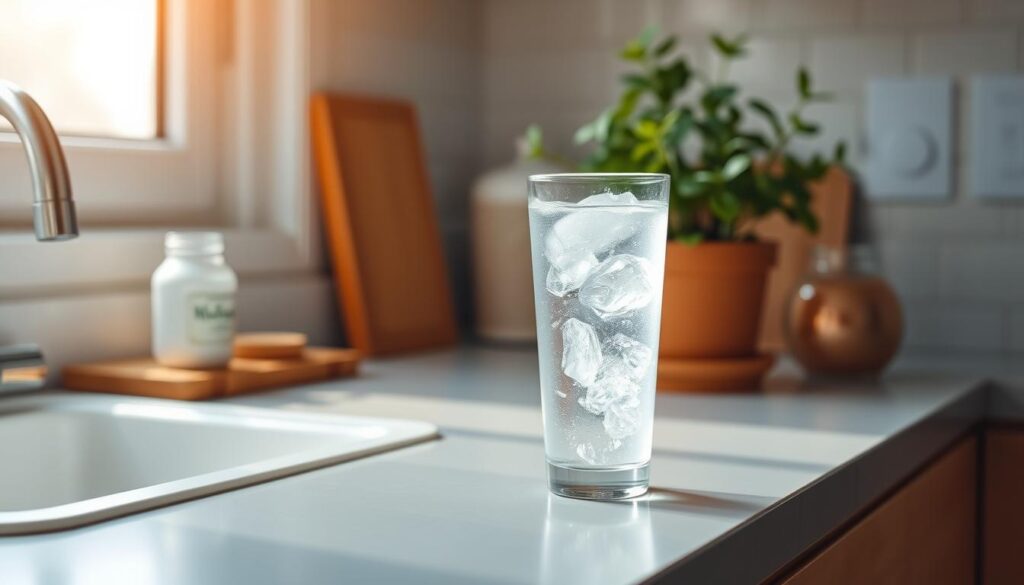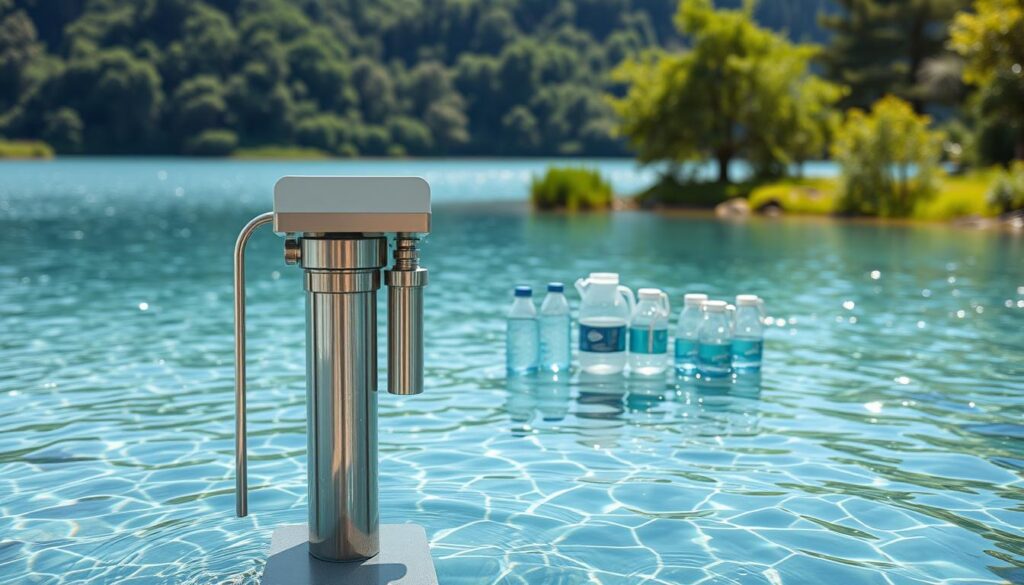Thinking about the journey of tap water to my glass makes me realize how far it goes. It travels through miles of pipes, aquifers, and treatment systems. Even with tough treatment, tap water can sometimes taste or smell bad.
Using a carbon filter is a simple and effective way to improve tap drinking water. You can find them under the sink, in the fridge, or on the countertop. A carbon filter for water can really make a difference.
With so many carbon water filters out there, picking the right one can be tough. In this guide, I’ll help you understand the important features, benefits, and things to think about. We’ll find the best carbon water filters for your home together.
Key Takeaways
- Understand the different types of carbon water filters available.
- Learn about the key features to look for in a carbon filter for water.
- Discover the benefits of using a carbon filter for your drinking water.
- Find out how to choose the best carbon water filters for your needs.
- Explore the factors that impact the effectiveness of carbon water filters.
Understanding Carbon Water Filters
It’s important to know how carbon water filters work. They use activated carbon to clean water. This process is called adsorption.
Activated carbon is great at pulling out bad stuff from water. It makes water taste better and removes harmful substances.
What Are Carbon Water Filters?
Carbon water filters use activated carbon to clean water. Activated carbon comes from things like coconut shells or coal. It’s processed to have lots of tiny holes.
These holes help the carbon grab onto things like chlorine, dirt, and chemicals. This makes the water clean and safe to drink.
How Do They Work?
Carbon water filters work by adsorbing bad stuff. When water goes through the filter, the carbon pulls out impurities. This leaves you with clean, safe water.
How well they work depends on the carbon, how fast the water flows, and the filter’s design.
Types of Carbon Filters
There are many kinds of carbon filters. Each one is different and used for different things. Here are a few common ones:
- Activated Carbon Block Filters
- Granular Activated Carbon Filters
- Whole House Carbon Filters
Let’s look at what makes each type different in this table:
| Filter Type | Effectiveness | Flow Rate | Maintenance |
|---|---|---|---|
| Activated Carbon Block | High | Medium | Regular Replacement |
| Granular Activated Carbon | Medium | High | Periodic Replacement |
| Whole House Carbon | High | High | Regular Maintenance |
Knowing about the different carbon filters helps you choose the right one for you.
Benefits of Using Carbon Water Filters
Using a carbon water filter has many benefits, and I’ve seen them in my home. It has made my drinking water much better.
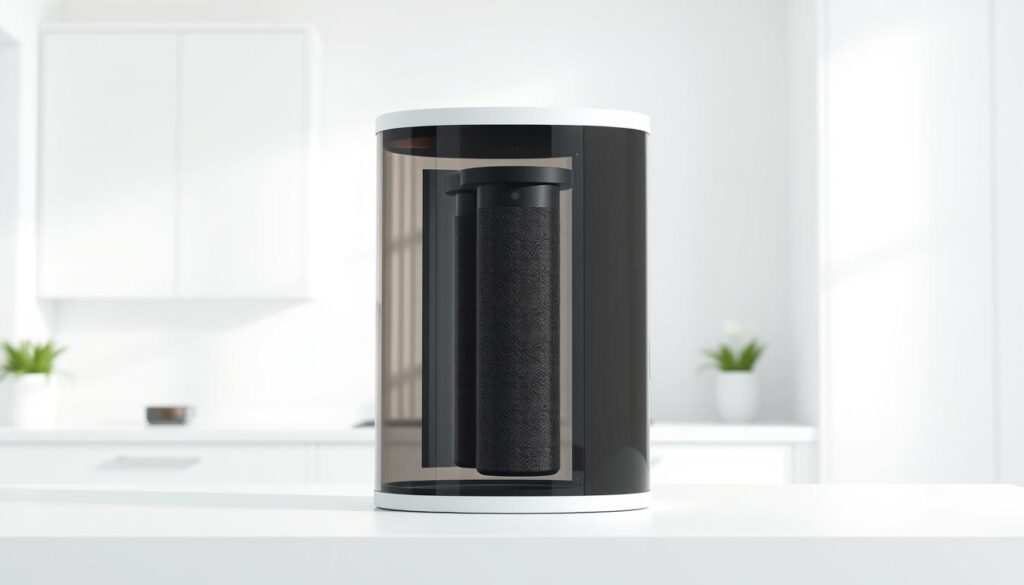
Improved Taste and Odor
The taste and smell of my water have greatly improved. Carbon water filters remove chlorine and other chemicals that make water taste bad. This makes drinking water more enjoyable.
Reduction of Contaminants
These filters also reduce contaminants in my water. They catch lead, VOCs, and other harmful substances. This makes my water safer to drink.
Cost-Effective Solution
Using a carbon water filter is also cost-effective. It’s cheaper than buying bottled water or other systems. I save money and help the environment too.
Adding a carbon water filter to my home was a smart choice. It gives me clean, tasty water without breaking the bank.
Common Contaminants Removed by Carbon Filters
Carbon water filters are great at removing many contaminants. They improve the quality of drinking water in a big way.
The Water Quality Association says, “Activated carbon filtration is a top choice for better drinking water.” This is because carbon filters for water catch lots of pollutants.
Chlorine and Chloramines
Carbon water filters take out chlorine, which can taste bad and smell off. Chloramines, a mix of chlorine and ammonia, are also gone. The EPA says, “chloramines keep water safe longer.”
“But, high-quality best carbon water filters can remove them too.”
Sediment and Particulates
Carbon filters for water also get rid of sediment and particles. These can make water look cloudy and may have bad stuff in them. Carbon filters make water look and taste better.
Volatile Organic Compounds (VOCs)
Carbon water filters are good at taking out VOCs. VOCs are chemicals that can easily get into water. They come from places like industrial waste and pesticides. Using a good carbon filter for water cuts down on exposure to these harmful chemicals.
NSF International says, “Activated carbon filters can remove VOCs, including some pesticides and industrial chemicals.” This makes best carbon water filters key for clean water.
Factors to Consider When Choosing a Carbon Filter
Choosing the right carbon water filter involves several important factors. The carbon water filtration system must meet your specific needs. This ensures it works well for you.
Filter Material
The material of the filter is key to its success. Activated carbon is a top pick because it can remove many contaminants. Look at the type of activated carbon, like carbon block or granular activated carbon.
- Carbon block filters catch finer particles and contaminants.
- Granular activated carbon filters have a large surface area for adsorption.
Flow Rate
The flow rate of a carbon filter shows how fast water is filtered. A faster flow rate is handy but must not harm the filter’s performance. Think about your household’s water needs when picking a carbon block water filter.
- A higher flow rate is good for big households.
- A lower flow rate works well for small households or individuals.
Filter Lifespan
The lifespan of a carbon filter is also vital. It tells you how often you’ll need to replace it. A longer-lasting filter can save money over time. When picking a carbon water filtration system, think about its lifespan and replacement costs.
By looking at these factors, you can pick a carbon filter that fits your needs. It will give you clean, safe drinking water.
Popular Brands of Carbon Water Filters
In my search for the best carbon water filters, I found several top brands. These brands are known for their quality and meet different needs and tastes.
Brita
Brita is a well-known name in water filters. They offer pitcher-style filters that are easy to use and improve water taste and smell. Their filters remove chlorine and lead, making them a good choice for those looking for a simple, affordable solution.
PUR
PUR is another well-liked brand with a range of carbon water filters. They have faucet-mounted and pitcher-style filters. PUR filters remove VOCs and heavy metals, and are easy to install and maintain.
AquaCera
AquaCera specializes in advanced water filtration systems. Their filters remove a wide range of contaminants, providing superior water quality. AquaCera filters are known for their high performance and long-lasting life.
When comparing these brands, it’s important to look at filter lifespan, flow rate, and certification standards. Here’s a summary of each brand’s key features:
| Brand | Filter Type | Contaminants Removed | Filter Lifespan |
|---|---|---|---|
| Brita | Pitcher-style | Chlorine, Lead | Up to 40 gallons |
| PUR | Faucet-mounted, Pitcher-style | VOCs, Heavy Metals | Up to 100 gallons |
| AquaCera | Advanced Filtration Systems | Broad Spectrum of Contaminants | Up to 2000 gallons |
Each brand has its own strengths and features. By considering your needs and preferences, you can find the best carbon water filter for your home. It’s important to choose products that meet NSF/ANSI standards and have the necessary certifications.
Different Types of Carbon Filters
It’s important to know the different types of carbon filters to choose the right one. Carbon filters are key in many water systems. Their variety can make picking one hard.
There are several types of carbon filters, each with its own features and uses. The main ones are activated carbon block filters, granular activated carbon filters, and whole house carbon filters.
Activated Carbon Block Filters
Activated carbon block filters are great at removing many contaminants from water. They work by pushing water through a block of activated carbon. This blocks impurities. Studies show these filters can remove up to 99% of some contaminants, making them a top pick for drinking water.
Key benefits of activated carbon block filters include:
- High contaminant removal efficiency
- Improved taste and odor
- Effective against a broad spectrum of chemicals
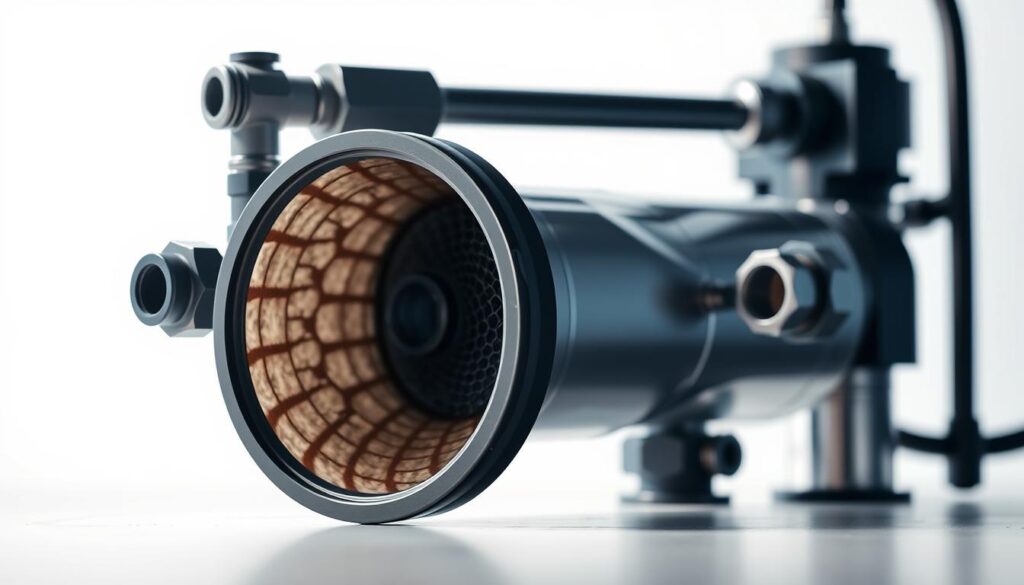
Granular Activated Carbon Filters
Granular activated carbon (GAC) filters use loose granular carbon. They are good at removing chlorine, taste, and odor from water. They are often found in pitcher filters and faucet-mounted filters.
A notable advantage of GAC filters is their cost-effectiveness and ease of replacement. But, they might not be as good as carbon block filters against some contaminants.
Whole House Carbon Filters
Whole house carbon filters filter all the water in a home. They are installed at the water supply’s entry point. They offer broad protection against contaminants.
“Whole house carbon filtration systems offer a complete solution for households looking to improve their water quality throughout the home.”
These systems are more complex to install and keep up than others. But, they treat all the water in the home.
In conclusion, the right carbon filter depends on your specific needs and preferences. Knowing the different types helps make the best choice for your water filtration needs.
Installation and Maintenance of Carbon Filters
To get the most out of my carbon filter for water, I need to understand how to install and maintain it. A carbon water filter is a valuable investment in my health and wellness. But, its effectiveness depends on proper setup and ongoing care.
Installation Steps
Installing a carbon filter is easy. First, I need to choose the right location for the filter, usually under the sink or at the point of use. Next, I must attach the filter to the water supply line, ensuring a secure connection to prevent leaks. It’s essential to follow the manufacturer’s instructions for specific installation requirements, as different models may have unique needs.
The installation process may also involve replacing the existing filter cartridge or setting up a new filtration system. I should check for any additional components, such as mounting brackets or tubing, and ensure they are properly connected. By taking the time to install the filter correctly, I can enjoy clean and fresh-tasting water for years to come.
Regular Maintenance Practices
Regular maintenance is key to the longevity and effectiveness of my carbon water filter. One of the most important tasks is replacing the filter cartridges as recommended by the manufacturer. Over time, the carbon becomes saturated with contaminants, reducing its ability to filter out impurities. By replacing the cartridges regularly, I can ensure that my drinking water remains clean and safe.
In addition to replacing cartridges, I should also check the filter for any signs of wear or damage. This includes inspecting the filter housing, O-rings, and other components for leaks or deterioration. Regular cleaning of the filter housing and surrounding area can also help prevent the buildup of bacteria and other contaminants. By following these simple maintenance practices, I can maximize the performance of my best carbon water filters and enjoy consistent, high-quality drinking water.
Understanding Filter Certifications
Filter certifications are key to ensuring carbon water filters work well and are safe. When I look to buy a carbon water purifier, I check for certifications. These confirm it can remove harmful contaminants.
NSF/ANSI certification is a top standard in water filtration. NSF/ANSI standards are set by NSF International and the American National Standards Institute. They cover many contaminants, like chlorine, lead, and VOCs.
NSF/ANSI Standards
NSF/ANSI standards are vital. They offer third-party proof of a filter’s performance. These standards test filters to see if they can remove certain contaminants. This ensures they are safe and effective.
- NSF/ANSI Standard 401: Covers emerging contaminants like pharmaceuticals and personal care products.
- NSF/ANSI Standard 42: Focuses on aesthetic effects, such as taste and odor reduction.
- NSF/ANSI Standard 53: Addresses health effects, including the removal of contaminants like lead and VOCs.
Importance of Certifications
Certifications like NSF/ANSI are very important. They give consumers confidence in their top rated carbon water filters choice. By picking a certified filter, I know it’s been tested and proven to remove many contaminants.
“Certification is key to ensuring that a water filter is effective and safe for use. It’s not just about removing contaminants; it’s about providing peace of mind for consumers.”
When I’m ready to buy carbon water filters, I always check for these certifications. It’s a simple way to know I’m getting a quality product. This ensures I have safe and clean drinking water.
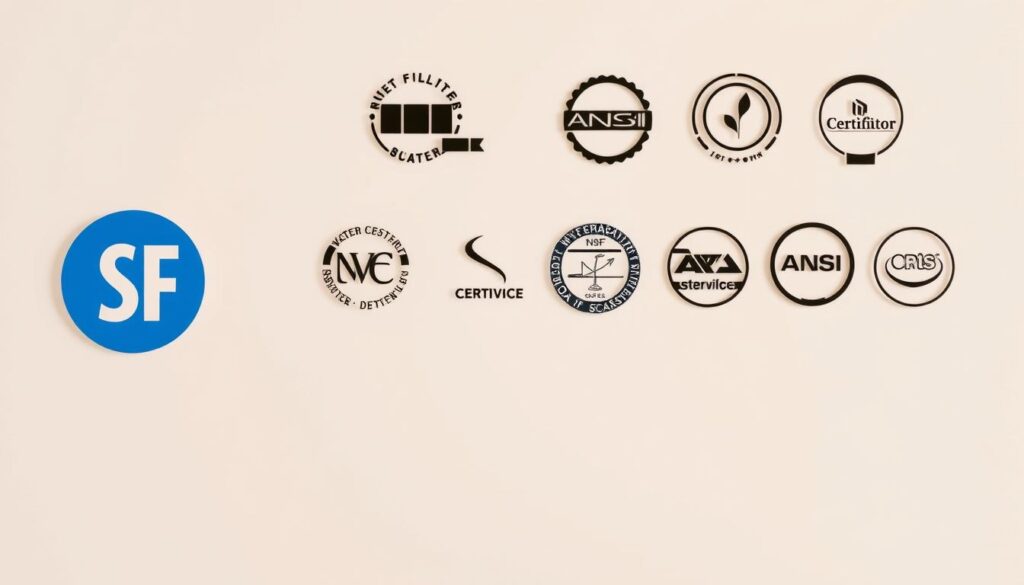
Frequently Asked Questions About Carbon Filters
I’ve gathered answers to common questions about carbon filters. They are great for making your drinking water better. Knowing how they work can help you choose the right one.
How Often Should I Replace My Filter?
How often to replace a carbon filter depends on a few things. This includes the filter type and how much water you use. Usually, you should replace activated carbon filters every 1-3 months. But some might last longer. Always check the maker’s advice for the best results.
Are Carbon Filters Safe for Drinking Water?
Yes, carbon filters are safe for drinking water. But, make sure to pick one that meets NSF/ANSI standards. These standards help ensure the filter removes harmful stuff. Remember, “Safety first” when it comes to drinking water, and carbon filters can be a good choice.
“The right water filter can make all the difference in the taste and safety of your drinking water.”
Can I Use a Carbon Filter for Well Water?
Carbon filters can work for well water, but their success depends on the water’s quality. Well water might have sediment, bacteria, and VOCs. A carbon filter can help remove some of these, but a full water treatment system is often better. For more info, check out my guide to finding safe drinking water for your family.
Understanding these common questions can help you pick the right carbon water filter for you.
My Recommendations for Top-Rated Carbon Filters
In my search for the best drinking water, I found top carbon water filters. I’ve looked at many options and picked the best ones for different needs and budgets.
Budget-Friendly Options
Looking for something affordable? There are great carbon water filters for you. The PUR Classic 11 Cup Pitcher is a great choice. It’s cheap but works well to make your water taste better.
- PUR Classic 11 Cup Pitcher
- Affordable and easy to use
- Effective in reducing common contaminants
Premium Choices
Want a top-notch carbon water filter? Check out the iSpring RCC7. It’s a premium filter that makes sure your water is the best quality.
- iSpring RCC7
- Advanced 5-stage filtration system
- High-performance and durable
Specialty Filters for Specific Needs
Need a filter for something specific? The ZeroWater 10-Cup 5-Stage Pitcher is perfect. It removes lots of contaminants, great for bad water areas.
- ZeroWater 10-Cup 5-Stage Pitcher
- Designed for high contaminant removal
- Ideal for areas with poor water quality
Choosing a carbon water filter depends on your needs. Whether it’s saving money, wanting advanced features, or specific filtration, these top-rated filters can help. They make your drinking water cleaner and tastier.
Conclusion: Making the Right Choice for My Water Quality
Choosing the right carbon water filter can be tough. But, by looking at the key features and benefits, I can make a smart choice. This choice will improve my water quality.
Key Considerations
When picking a carbon water filter, I must think about a few things. These include the filter type, how well it works, and how easy it is to maintain. The best filters offer clean water and are easy to care for.
Final Thoughts
In my search for the best carbon filter, I’ve found a few important things. I need to check if the filter is certified, how fast it filters water, and how long it lasts. This ensures it meets my needs and gives me the best water quality.
With this guide, I can pick a carbon water filter that fits my needs. And I’ll enjoy drinking clean, fresh water.
FAQ
How often should I replace my carbon water filter?
Replacing a carbon water filter depends on how often you use it and the type of filter. Usually, you should replace it every 1-3 months. But, always check the manufacturer’s guidelines for the best time.
Are carbon water filters safe for drinking water?
Yes, carbon water filters are safe for drinking. Just make sure to pick one that meets NSF/ANSI standards. This ensures it removes harmful contaminants safely.
Can I use a carbon filter for well water?
Yes, you can use a carbon filter for well water. But, the filter’s type and effectiveness depend on the water’s contaminants. It’s important to test your well water first to choose the right filter.
What is the difference between activated carbon block filters and granular activated carbon filters?
Both types of filters are effective, but they work differently. Activated carbon block filters use a solid block to filter water. Granular activated carbon filters use loose granules. Block filters are often better at removing contaminants.
How do I know if a carbon water filter is certified?
Look for NSF/ANSI certifications to check if a filter is certified. These are recognized standards for water filtration. You can find this information on the manufacturer’s website or on the product packaging.
Can I install a carbon water filter myself?
Yes, many carbon water filters are easy to install yourself. Just make sure to follow the manufacturer’s instructions carefully. This ensures proper installation and maintenance.
How do I maintain my carbon water filter?
To keep your filter working well, replace filter cartridges and clean the housing regularly. Check the manufacturer’s guidelines for specific maintenance steps.
Are carbon water filters effective in removing VOCs?
Yes, carbon water filters can remove VOCs from drinking water. They do this through adsorption, attracting and holding onto contaminants like VOCs.


